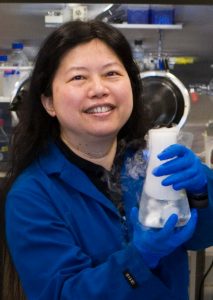 Professor Yilin Hu from the Department of Molecular Biology and Biochemistry works on bacterial nitrogenase and related systems – a unique group of enzymes with global implications. In a new publication in the journal, Nature Catalysis, Professor Hu and her team found that one component of the nitrogenase enzyme, which contains a simple iron-sulfur cluster, can convert carbon dioxide (CO2) to hydrocarbons under ambient conditions. Short-chain hydrocarbons like methane, ethane and propane can be used as fuel for a variety of purposes, and their production under ambient conditions can help reduce the cost of commercialized production.
Professor Yilin Hu from the Department of Molecular Biology and Biochemistry works on bacterial nitrogenase and related systems – a unique group of enzymes with global implications. In a new publication in the journal, Nature Catalysis, Professor Hu and her team found that one component of the nitrogenase enzyme, which contains a simple iron-sulfur cluster, can convert carbon dioxide (CO2) to hydrocarbons under ambient conditions. Short-chain hydrocarbons like methane, ethane and propane can be used as fuel for a variety of purposes, and their production under ambient conditions can help reduce the cost of commercialized production.
The research team also probed into the reaction mechanism for the chemical conversion of CO2 by the iron-sulfur cluster. This step-by-step reaction pathway illustrates out how the iron-sulfur cluster takes CO2 molecules and makes hydrocarbons like methane and ethane. Understanding the details of this reaction pathway can help optimize the chemical conversion of CO2 and could potentially lead to additional cost reductions in the future development of commercial hydrocarbon fuel production.
Hydrocarbon production from gases like CO2 has the potential to replace oil-based fossil fuels with a renewable and sustainable energy source. Along with her long-time collaborator, Chancellor’s Professor Markus Ribbe from the Department of Molecular Biology and Biochemistry, Professor Hu has done remarkable work unraveling the mysteries behind the nitrogenase enzyme and its role in hydrocarbon production. Their continued studies along this line will help optimize future designs for biofuel production, improving efficiency and reducing cost.
